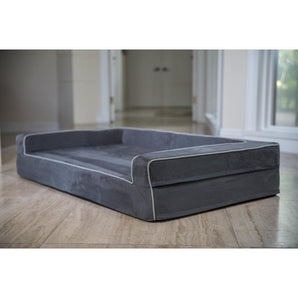
One of the best decisions I’ve ever made is to bring a large breed dog into my life – it instantly brought a new energy and joy into my household that hadn’t been there before. While the process to take ownership of my dog and bring him home for the first time was grueling, I’m glad I gave careful consideration and thought to it.
A lot of future dog owners just want to get their new pup as soon as possible and don’t consider all the questions they need to ask themselves before taking on this big responsibility. And because I want you to be able to make the most informed decision when it comes to bringing a dog into your life, I’ve created this post to help tackle one of the most crucial questions:
When should you neuter a large breed dog?
If you’re adopting, most dogs from the shelter will already be neutered. But if you’re buying, or your pup hasn’t gone through the process yet, I’ll explain everything you need to know about neutering a large dog breed.
What is neutering?
Neutering is typically the term used to describe the castration of a male dog’s testes. With female dogs, this is called a spay and is a much more complicated surgery than neutering. The veterinarian typically makes an incision near the front of the scrotum and removes the testes through that incision.
Why should you neuter your dog?
People neuter their pups for many different reasons.The four common reasons are convenience, birth control, behavioral issues in male dogs, and other health concerns.
However, two of these common reasons are deemed as a myth. They don’t prevent behavioral issues in male dogs and they don’t prevent health concerns. So, it boils down to a matter of convenience and birth control. If you’re not looking to breed your dog then you may be comfortable with neutering your dog as a means of controlling whether they’re reproducing or not.
Keep in mind that neutering your dog will not prevent him from humping things, or fix his behavior. It will simply help your dog not reproduce.
Take your dog’s weight into consideration
When deciding when you should neuter your large breed dog, you should definitely take your dog’s weight into consideration. Studies show that both spaying and neutering your dog over time can contribute to weight gain.
It increases the risk of obesity in dogs because it decreases the metabolic rate so environmental factors like lack of exercise and calorie intake take a much bigger effect on dogs who have been spayed or neutered.
The Atlantic states, “The link between obesity and spaying or neutering has to do with hormones. Removing a dog’s testicles or ovaries disrupts its hormonal balance, and this makes it both hungrier and slows its metabolism to require fewer calories. Yet animal-welfare groups that promote spaying and neutering are often quick to “debunk” the idea that fixing a dog could make it gain weight.”
So, when deciding to neuter your large breed dog, it’s important to take your dog’s weight into consideration because increased weight gain could lead to other harmful issues.
Take your dog’s age into consideration
What is the best age to neuter a male dog? This is a common question among dog owners who are considering neutering.
While some animal shelters in the US require neutering of all dogs before adoption, regardless of age, there are some that recommend delaying the neutering phase until age 1 or later. A lot of dog owners may also be wondering if there are any side effects of neutering a dog too early or if there are any benefits of waiting to neuter their pup.
A study conducted by the University of California states that “larger mixed-breed dogs — those weighing at least 43 pounds as adults — have a significantly heightened risk of certain joint disorders if they are spayed or neutered before age 1. Smaller mixed-breed dogs are not at greater risk.”
The pet hospital recommends that you neuter your dog on an individual basis: “In general, in small breed dogs (less than 50 pounds) we recommend spaying around 6 months. In large breed dogs (greater than 50 pounds) we recommend waiting until after skeletal maturity but before the second heat cycle (usually 12-15 months) in spaying female dogs or anytime after skeletal maturity in male dogs.”
As a general rule of thumb large breed dogs should be older than 2 years before you decide to neuter them. Please remember that dogs neutered as adults have a slightly higher risk of postoperative complications, as well as dogs that are overweight or dogs that have health problems.
Take your dog’s health risks into consideration
When deciding when to neuter your dog, it’s important to keep their health risks into consideration. This could be one of the reasons not to neuter your dog. Since neutering can increase the likelihood of things like obesity, it’s important to pay attention to what risks it could possibly cause.
The journal of Veterinary Internal Medicine created a study that shows, “… neutering dogs appeared to increase the risk of cardiac tumour in both sexes.” The results showed that spayed females were five times more likely to suffer tumours of the heart than intact females (Ware and Hopper 1999), one of the three most common cancers in dogs today.”
Another study concluded that, “Upon further investigation using 683 male and female Rottweilers spayed or neutered before one year of age, both sexes were found to be significantly more likely to develop bone cancer than intact dogs with early sterilisation bestowing a staggering 25% likelihood of bone cancer in your Rottweiler (Cooley et al. 2002).”
The bottom line: know your dog and the certain diseases or health risks that can be associated with its breed. Always take this into consideration before deciding to get them neutered or spayed.
Take your dog’s joints into consideration
In addition to other health risks that are often linked to neutering your dog, you should also take your dog’s joints into consideration. The University of California concluded, “The risk of joint disorders for heavier dogs can be up to a few times higher compared to dogs left intact. This was true for large mixed-breed dogs. For example, for female dogs over 43 pounds, the risk jumped from 4% for intact dogs to 10-12% if spayed before a year of age.”
I know it seems as if something as simple as neutering shouldn’t affect a dog’s long term growth, but according to vethelpdirect.com, “sex hormones have a massive impact on the development of the skeletal system. Think of growth spurts in puberty, for example. And these conditions are all associated with suboptimal bone alignment in joints, resulting in unusual wear or movement of the joint. So, it’s perfectly reasonable that by preventing the dog’s normal puberty from completing, we are altering the way these joints form. In a smaller dog, with smaller joints, the mismatch isn’t enough to cause a problem. However, in a large breed dog, it can cause disease.”
Having an orthopedic dog bed for your pup will help ease the pain on their joints as they get older, but taking their joints into consideration is something you will need to think about when deciding whether or not to neuter your dog.
Take your dog’s urinary health into consideration
When weighing the pros and cons of neutering your dog, it’s also important to take into consideration urinary health because some dogs may experience urinary health issues later down the line..
Vetrxdirect.com states that, “The neutering process involves removing the testicles, which are responsible for producing the male hormone, testosterone. Testosterone, like estrogen, helps control the urinary sphincter and provides the dog with bladder control. Just like female dogs, male dogs who are not neutered may also develop urinary incontinence due to a decline in testosterone.”
Neutering may cause your dog the inability to hold their urine for a certain period of time which results in unlikely mistakes around the house. While there is treatment available, why get treatment for something that could have been prevented in the long term? It’s something to consider.
Medical benefits to neutering
So far I’ve explained a lot of the cons when it comes to neutering your large breed dog, but what are some of the medical benefits to neutering your dog?
“Castration eliminates the possibility of testicular cancer and greatly reduces the chance of prostate disease, two extremely common and serious problems of older male dogs. Many older dogs that are not neutered will develop prostate disease or testicular tumors if they survive to an old enough age. Castration can also reduce the risk of perianal tumors and perineal hernias.”
It also helps with population control where millions of unwanted dogs are sitting in animal shelters waiting to be adopted or euthanized because they go unadopted. There aren’t any proven studies that show a dog’s behavior will improve over time after being neutered. Those things are heavily dependent on your dog’s individual personality, physiology, and history.
Conclusion
There are both pros and cons to getting your large breed dog neutered. It boils down to your particular preferences, your particular dog, your dog’s breed, age, and if you want your dog to reproduce.
If you’re okay with raising your dog’s babies, then go for it! If not, then neutering your dog may be the best option for you. If you do decide to get your large breed dog neutered, be sure that you follow all of the advice from the veterinary clinic. The pre-surgical advice is key to ensuring that your pup has adequate nutrition and is prepped and ready for their surgery.
Post surgery, be sure to allow a safe, quiet space indoors with a nice large dog bed for your dog to recover. Keep them away from their incision site and avoid bathing them for at least ten days after their procedure. Be sure to pay close attention for swelling, or redness and if there are complications then contact your veterinarian as soon as possible.
Ultimately, welcoming a large breed dog into your home is a wonderful thing -- whether you decide to get them neutered or not. Take this question seriously when considering getting a new pup and the process to getting your dog will become 1,000x easier.




